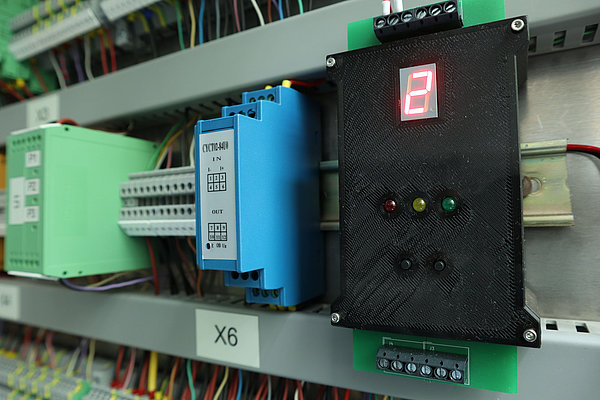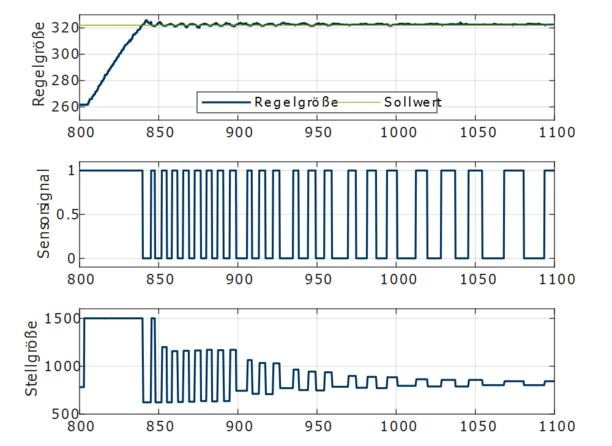Adaptive Controller - Two-position controller with reduced control-value range
Ref.-No. 5326
Keywords: Adaptive control, Process control, Control of switched systems, Discontinuous control, Hybrid, switched systems modeling
Dynamic systems can often be controlled with a two-point controller and a simple sensor that only indicates when a threshold value is reached or not. Here, for example, a motor is switched on until the threshold is exceeded. Then the motor is switched off and only switched on again when the value falls below the threshold again. This behavior results in the motor either being switched off or being operated at a high power. As a rule, this leads to high wear and higher energy consumption.
In contrast to conventional binary controllers, the adaptive controller can reduce the oscillation of the system output to a minimum, thus reducing wear and energy consumption. The adaptive controller adapts an internal plant model to the real plant in order to calculate an optimal plant input. The described adaptation is fully automated and does not require user interaction or any other than the existing binary sensors, making the proposed controller as easy to implement as a conventional on-off controller.
Competitive Advantages
- Reduced range of control values
- Flexible
- Retrofittable
- Energy saving
- Reduced wear
Commercial Opportunities
The Adaptive Controller can be used in many areas, such as:
- Circulation pumps
- Rainwater retention basin
- Humidifiers/ air compressors
- Portafilter machines
- Household appliances such as ovens or hobs
Inexpensive retrofitting is possible. The fluctuations in the process variables reduced by the adaptive controller also reduce wear and tear and energy consumption. In a laboratory test, the energy consumption could be reduced by 70% with the adaptive controller.
Current Status
The german patent application has been granted at the German Patent and Trademark Office and further developed within the NRW patent validation project. International patent applications are still possible. On behalf of the Ruhr-University Bochum, we offer interested companies the technology for licensing and further development.
Technology Readiness Level
1
2
3
4
5
6
7
8
9
System prototype demonstration in operational environment
Relevant Puclications
1) S. Leonow, T. Gunder and M. Mönnigmann. A self-learning binary controller for energy efficient pump operation. Proceedings of the 4th International Rotating Equipment Conference 2019 (IREC19), Wiesbaden: 1-10, 2019.
2) S. Leonow and M. Mönnigmann. Adaptive control for systems with two binary measurements. IFACPapersOnLine,53(2): 3779-3784, 2020.
—
An invention of the Ruhr-University Bochum.




